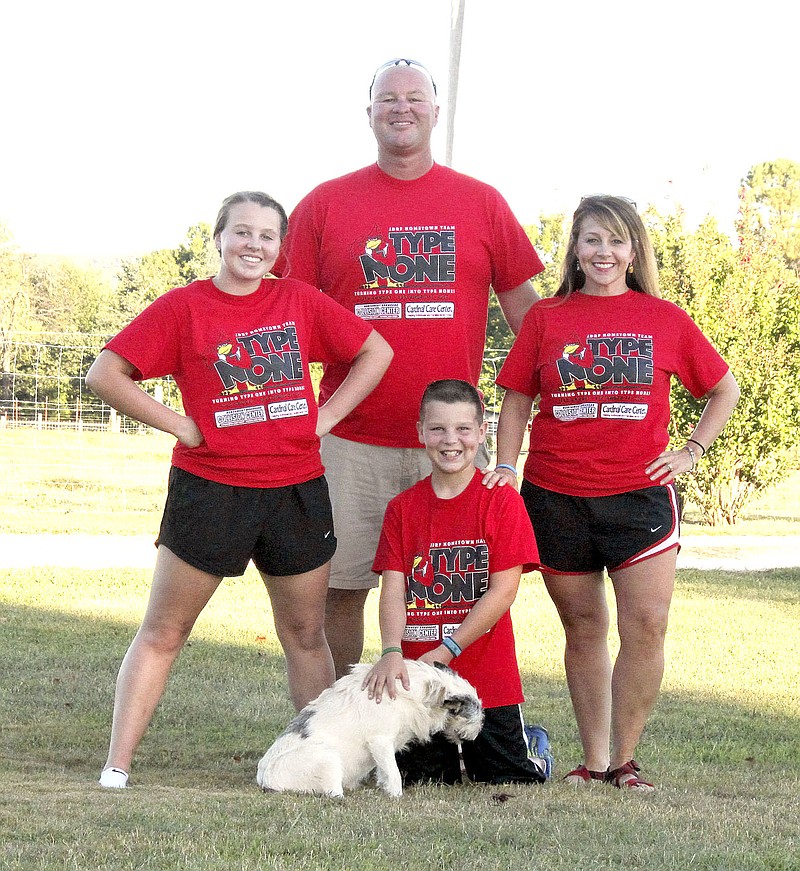FARMINGTON -- The 12th annual Farmington Hometown Walk to Cure Diabetes will have a few changes this year but not too many because of the success of the event in years past.
The walk will be held later in the morning to accommodate kids involved in youth football and the route is shorter to help those families who are pushing strollers or have small children walking alongside them.
Registration begins at 11 a.m. Saturday (Sept. 24) in the vacant lot next to the former Marvin's IGA store on Cimarron Way. The walk will start at 12:30 p.m. and will go down Southwinds Drive to the Farmington sports complex parking lot and then return the same way, about 1.5 miles.
A new family assumed leadership of the Farmington Walk to Cure last year.
Beau Lovell, now 10 and a fifth-grader at Ledbetter Intermediate School in Farmington, was diagnosed with Type 1 diabetes two years ago and when asked, his mother, Stephanie Lovell, quickly agreed to take over the walk to help raise money for research to find a cure for Type 1 diabetes.
This year, the Diabetes Walk also will include free hot dogs, chips and cookies, snow cones, a silent auction and live auction. Other activities for children will include a bouncy house and enclosed, inflatable BB gun shoot and face painting/tattoos.
Woody Allen with KIX 104 will emcee the event and Dean Froud will provide music.
Last year the walk raised $17,000 and this year's goal is to raise $20,000 for the Juvenile Diabetes Research Foundation.
Lovell chairs a committee of nine people who have met throughout the year to plan the 2016 Walk to Cure. She said she is excited about how the walk continues to grow.
This year, she changed sponsorship opportunities and 17 sponsors have donated $13,000, ranging in amounts from $350 to $1,500. Those who donated $500 or more have their business logo printed on the back of the Walk to Cure T-shirt. All sponsors will be listed on a banner displayed at the walk.
Presenting sponsors are NWA Collision Center and Cardinal Care Center, both of Farmington. Each business donated $1,500.
In addition, many businesses, organizations and others have donated items for the silent and live auctions. Some items include a package for 10 to High Rise in Rogers, spa treatments, Junk Ranch tickets, a Disney basket, grill, camping equipment and items from Lewis & Clark and Pack Rat.
"We will have a wide variety of things," Lovell said.
Type 1 diabetes is different than Type 2 diabetes in that there is no known cause and no known cure. It is a disease for life. It is a chronic condition in which the pancreas produces little or no insulin, a hormone needed to allow sugar to enter cells to produce energy.
Lovell said she has been impressed with how Beau has dealt with the condition. He gives himself four insulin injections daily and sometimes wears an insulin pump. The adhesive from the pump irritates his skin so it is not something that is used often, she said.
"It's our new normal," Lovell said, adding, "We treat him like a healthy kid. He can eat anything the rest of us eat but he has to make sure to take insulin."
That does not mean, she said, that he eats cake every night but eats a healthy diet, along with the rest of his family.
Lauren Silvewright, senior development coordinator with NWA chapter of the Juvenile Diabetes Research Foundation, was diagnosed with Type 1 diabetes when she was 3 years old and has lived with it 22 years.
The Foundation's main goal is to find a cure for the disease but until then it is involved in trials to greatly improve the quality of life for people living with the condition.
Silvewright has participated in two clinical trials with an artificial pancreas and said the trials have given her hope for the future.
"I felt freedom for the first time in my life," Sivewright said. "It was life changing."
An artificial pancreas is an external device that communicates with an insulin pump to automatically manage insulin levels.
Other trials include "smart insulin" where patients only take one shot each day, instead of four, and encapsulated beta cell replacement therapies that sense changes in blood-sugar levels and release insulin and other required hormones as needed. The beta cell therapy would allow patients to be cured from Type 1 diabetes for a period of time, Sivewright said.
Sivewright said living with Type 1 diabetes is a daily struggle because everything affects insulin levels, such as exercise, sleep and food.
She said, though, JDRF has given her hope that her quality of life will continue to improve and confidence that one day a cure will be found for Type 1 diabetes.
General News on 09/21/2016
